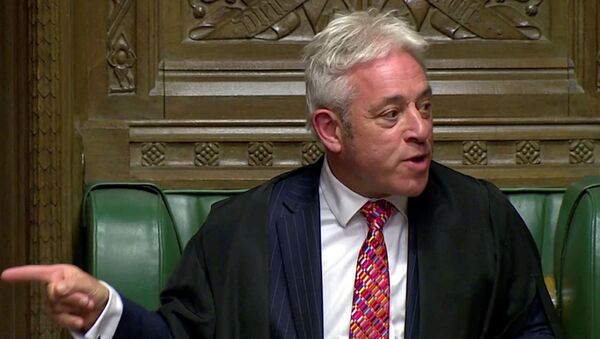British MPs have voted to reject a General Election on 12 December in the crucial vote.
A total of 299 MPs voted in support of PM proposal, with 70 voted against. However, Johnson has failed to secure the backing of the two-thirds of the 650 MPs required by law to pass the motion.
The vote in Parliament, under the Fixed Term Parliaments Act, came just hours after EU leaders agreed in principle to extend Brexit until 31 January, meaning Britain will not leave the bloc on Thursday, 31 October, as the Prime Minister had always maintained.
EU Council President Donald Tusk described it as a "flextension" - meaning Britain could still leave on 31 October if the UK and EU Parliaments vote in favour of a deal in time.
EU confirms today that Brexit is delayed. Again.
— The Brexit Party (@brexitparty_uk) October 28, 2019
We need a General Election and a Leave alliance to win a majority for a real Brexit. pic.twitter.com/bsypnpOmGx
Boris Johnson’s government then tabled a motion in Parliament for a general election on 12 December.
Mr Johnson said "nobody relishes a winter election" but he said this Parliament had "run its course."
He said the Labour Party leader Jeremy Corbyn was running away from the electorate and added: "He can run, but he can't hide any longer."
DO OR DIE? DEAD IN A DITCH?
— Darren McCaffrey (@DarrenEuronews) October 28, 2019
Or maybe not...
Here is CONFIRMATION LETTER from @BorisJohnson to EU ACCEPTING extension of #Brexit beyond October 31st... pic.twitter.com/L0BrBSMsMm
The Liberal Democrats and the Scottish Nationalist Party (SNP) are due to bring a separate motion on Tuesday, 29 October, calling for an election on 9 December.
The latest opinion poll, by Opinium, has the Conservatives on 40 percent, 16 points ahead of Labour on 24 percent and with the Lib Dems back on 18 percent and the Brexit Party on 10 percent.
"A million people didn't march last weekend for a General Election."
— People's Vote UK (@peoplesvote_uk) October 27, 2019
Well said @sianberry 👏The people want a #FinalSay on #Brexit, not a General Election.
Only a #PeoplesVote can solve the #Brexit crisis. Sign the letter & demand one now:
But due to Britain’s first-past-the-post system of voting it is unclear whether the Tories would win an outright majority, based on those poll numbers. If the Brexit Party were to take a considerable number of votes from Tory candidates in certain constituencies it could allow Labour candidates to win in Tory marginals.
Labour MP @SDoughtyMP asks about rumours that Boris Johnson is planning to ditch his marginal Uxbridge seat in favour of safer Sevenoaks or East Yorks (Michael Fallon is standing down but Greg Knight er, isn't).
— Pippa Crerar (@PippaCrerar) October 28, 2019
PM blushes on the frontbench 😳.
Mr Johnson’s own seat at Uxbridge & South Ruislip on the outskirts of London, where he has a majority of 5,000, could even be vulnerable if the Brexit Party has a good showing.
Labour’s shadow cabinet has agreed on a whip to abstain on an early general election. Lots of activists will be deeply disappointed. What happened to #GTTO? Where is the sense of urgency?
— Sienna Rodgers (@siennamarla) October 28, 2019
The UK has been mired in political turmoil since the Brexit referendum in June 2016 when Britons vote by 52 to 48 percent to leave the EU.
Conservative party leader David Cameron, who had campaigned to remain, resigned as prime minister the following day and his successor, Theresa May, led her party into a disastrous snap general election in 2017 which led to her losing her majority and being forced to rely on the 10 votes of the Democratic Unionist Party (DUP) from Northern Ireland.
Labour still planning to abstain on the PM's motion on general election this afternoon.
— Rowena Mason (@rowenamason) October 28, 2019
Time to see if No 10 serious about the Lib Dem plan for an election without having another push at the WAB - or whether it was a bluff to put pressure on Labour
After failing three times to get her negotiated Brexit deal through Parliament Mrs May resigned in June and was replaced by Boris Johnson who promised to get the UK out of the EU “with or without a deal” by 31 October.
We won’t be bullied into accepting Boris Johnson’s bad deal. We will fight for our communities, for jobs, for our environment and workers' rights. pic.twitter.com/IKBZ5K48fW
— The Labour Party (@UKLabour) October 28, 2019
Although he has failed to achieve that he is still riding high in the opinion polls and, based on advice from controversial spin doctor Dominic Cummings, is pushing the narrative that MPs are trying to seeking to block Brexit.
The slogan “Get Brexit done” was front and centre during the Conservative Party conference in Manchester and is likely to be prominent again during the Tory election campaign.
The Lib Dems have become the party of Remainers and Labour’s more nuanced narrative is struggling, especially with party leader Jeremy Corbyn saying he will probably remain neutral in the event of a second referendum.




